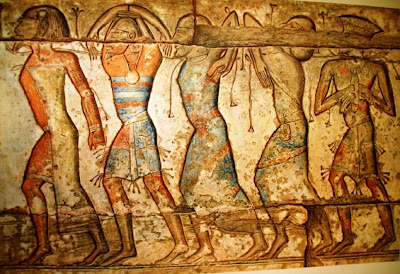Turning Prayer into Advocacy - Torah portion Chukat
Journeying from mount Hor, the Israelites "spoke against God and Moses," aggravated from lack of water and from eating manna, which they call leḥem hakelokel (despised or rotten bread). In response, the people are set upon with fiery serpents (neḥashim haseraphim), "fiery" possibly meaning poisonous or referring to the burning sensation of the bites they sustained. [1] After a multitude die, the people approach Moses and ask for help:
The meaning of 'hitpalel'
What exactly is lehitpalel? The usual translation is "pray." Is that to say then, that we envision Moses "davening," with eyes closed, swaying back and forth in quiet supplication? Did he go up to a mountaintop and cry out to God in exasperation? What did Moses actually do in his prayer? Though the more basic question is this: Why would Moses "pray" when he's able to stroll over to the Tent of Meeting and converse with YHVH face to face?
Contrary to the popular notion, the verb hitpalel in Biblical Hebrew does not mean "pray." It comes from the root palal - to pronounce judgment, to arbitrate or intercede, or speak up for someone (or oneself) in a matter of judgment. Cognates include palpel in Aramaic, to argue, and palālu in Akkadian, to supervise, go out in front. [2]
The picture to have therefore, is of Moses as an advocate, arguing his case in front of the judge, or throwing himself on the mercy of the court (palal also being a cognate of naphal, to fall down). The text does not tell us what Moses said, so we're left guessing as to which strategy he employed.
Despite the mistranslation of hitpalel, our modern-day concept of prayer is often viewed in the Biblical sense, as facing the divine judge with the desire to gain a more favorable judgment. (Though people tend to use the supplicatory approach, as opposed to the "arguing the case" approach.)
Can we persuade God? - Philosophical vs. Biblical approaches
The working assumption seems to be that God is able to be persuaded. This is a theological position with which Maimonides would take issue. He says explicitly that any human terminology used to describe God – not just corporeal terms like God's "hands" and "voice," but also descriptions of God as a "king" or "judge" – must be taken as a metaphor. [3] According to this view, the whole courtroom/judgment motif is metaphor, as is the concept of "changing God's mind" with our supplications, since that ascribes psychological malleability to God, a distinctly human characteristic. For Maimonides, the Torah describes God as having attributes such as "mercy" only for our sake, so that we strive to imitate God and thus cultivate higher character traits. [4]
Maimonides' theology represents the "God of the philosophers." It starts with what he considers to be the philosophically "correct" concept of God, and then works to demonstrate how the Torah can be understood in that light. From a historical perspective however, it is far more likely that ancient Israelite theology conceptualized YHVH in much more down-to-earth, human terms, e.g. envisioning God as actually getting angry and forgiving, and as being a monarch and judge in the plain, literal sense. The word elohim does after all mean both "God/gods" and "judges." Like other gods throughout the Ancient Near East, YHVH was little doubt viewed as an actual divine ruler who could be petitioned for clemency.
Thus when the Torah tells us that Moses interceded on behalf of the people, it was meant to convey his literally conversing with YHVH, divine monarch and judge, and succeeding in being persuasive enough for YHVH to change his mind, relent, and offer a solution.
Training ourselves to be advocates
What can we glean from the above about the concept of prayer in our day? Perhaps we can go back to the original idea of hitpalel, the idea being that we should learn how to "intercede" and "advocate." When faced with hardship and suffering in our own lives and the lives of people around us (whether we know them personally or not), there are two basic modes of reaction: One is to do nothing, either because we've become apathetic, numb to suffering, or we've given up, lost the necessary "grit" to keep fighting for better outcomes. Another reaction, which is embodied in the term hitpalel, is to train ourselves to be advocates, to care deeply and passionately, to display an unapologetic ethical bias toward people's well-being, and to summon the energy, courage and inextinguishable resolve to keep pushing for that well-being, as if the situation depended on us.
Because to the extent that we can do something about it, it does depend on us.
_________________
[1] See Baruch Levine, Numbers 21-36, Anchor Yale Bible, pp. 86-87, 2000.
[2] See Hebrew and Aramaic Lexicon, Köhler, Stamm and Baumgartner, 1993; also The Assyrian Dictionary of the Oriental Institute of the University of Chicago, 2005.
[3] See Maimonides' Guide for the Perlplexed, chapter 46 and others.
[4] See Guide, ch. 54.
וַיָּבֹא הָעָם אֶל מֹשֶׁה וַיֹּאמְרוּ חָטָאנוּ כִּי דִבַּרְנוּ בַי-הוָה וָבָךְ, הִתְפַּלֵּל אֶל יְ-הוָה וְיָסֵר מֵעָלֵינוּ אֶת הַנָּחָשׁ וַיִּתְפַּלֵּל מֹשֶׁה בְּעַד הָעָם
And the people came to Moses, and they said: We have sinned when we spoke against YHVH and against you; 'hitpalel' to YHVH so that he will remove the serpent from upon us; and Moses 'hitpalel-ed' on behalf of the people. (Num 21:7)
What exactly is lehitpalel? The usual translation is "pray." Is that to say then, that we envision Moses "davening," with eyes closed, swaying back and forth in quiet supplication? Did he go up to a mountaintop and cry out to God in exasperation? What did Moses actually do in his prayer? Though the more basic question is this: Why would Moses "pray" when he's able to stroll over to the Tent of Meeting and converse with YHVH face to face?
Contrary to the popular notion, the verb hitpalel in Biblical Hebrew does not mean "pray." It comes from the root palal - to pronounce judgment, to arbitrate or intercede, or speak up for someone (or oneself) in a matter of judgment. Cognates include palpel in Aramaic, to argue, and palālu in Akkadian, to supervise, go out in front. [2]
The picture to have therefore, is of Moses as an advocate, arguing his case in front of the judge, or throwing himself on the mercy of the court (palal also being a cognate of naphal, to fall down). The text does not tell us what Moses said, so we're left guessing as to which strategy he employed.
Despite the mistranslation of hitpalel, our modern-day concept of prayer is often viewed in the Biblical sense, as facing the divine judge with the desire to gain a more favorable judgment. (Though people tend to use the supplicatory approach, as opposed to the "arguing the case" approach.)
Can we persuade God? - Philosophical vs. Biblical approaches
The working assumption seems to be that God is able to be persuaded. This is a theological position with which Maimonides would take issue. He says explicitly that any human terminology used to describe God – not just corporeal terms like God's "hands" and "voice," but also descriptions of God as a "king" or "judge" – must be taken as a metaphor. [3] According to this view, the whole courtroom/judgment motif is metaphor, as is the concept of "changing God's mind" with our supplications, since that ascribes psychological malleability to God, a distinctly human characteristic. For Maimonides, the Torah describes God as having attributes such as "mercy" only for our sake, so that we strive to imitate God and thus cultivate higher character traits. [4]
 |
| Tablet of Shamash, solar deity of justice, 9th C. BCE |
Thus when the Torah tells us that Moses interceded on behalf of the people, it was meant to convey his literally conversing with YHVH, divine monarch and judge, and succeeding in being persuasive enough for YHVH to change his mind, relent, and offer a solution.
Training ourselves to be advocates
What can we glean from the above about the concept of prayer in our day? Perhaps we can go back to the original idea of hitpalel, the idea being that we should learn how to "intercede" and "advocate." When faced with hardship and suffering in our own lives and the lives of people around us (whether we know them personally or not), there are two basic modes of reaction: One is to do nothing, either because we've become apathetic, numb to suffering, or we've given up, lost the necessary "grit" to keep fighting for better outcomes. Another reaction, which is embodied in the term hitpalel, is to train ourselves to be advocates, to care deeply and passionately, to display an unapologetic ethical bias toward people's well-being, and to summon the energy, courage and inextinguishable resolve to keep pushing for that well-being, as if the situation depended on us.
Because to the extent that we can do something about it, it does depend on us.
_________________
[1] See Baruch Levine, Numbers 21-36, Anchor Yale Bible, pp. 86-87, 2000.
[2] See Hebrew and Aramaic Lexicon, Köhler, Stamm and Baumgartner, 1993; also The Assyrian Dictionary of the Oriental Institute of the University of Chicago, 2005.
[3] See Maimonides' Guide for the Perlplexed, chapter 46 and others.
[4] See Guide, ch. 54.



Comments
Post a Comment
Not sure how to leave a comment? By "Comment as", either choose your Google ID, OR select "Name/URL". Type your name and leave URL blank (if you don't have a web address). Then hit "Publish", type in the letters/number shown, and again "Publish". I don't mind anonymous comments, but please use a pseudonym.